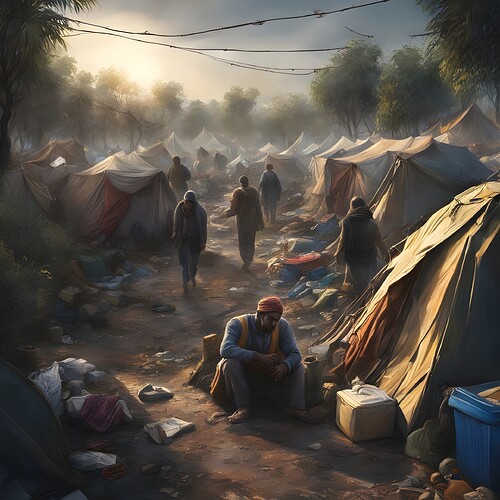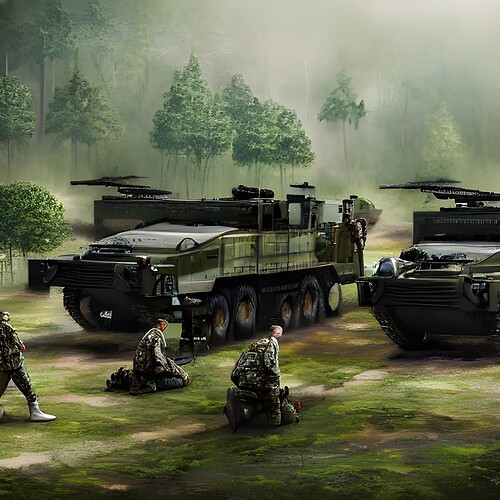Explosions and Gunfire Shake Alkantara as Militant Activity Escalates; Aid Organizations Overwhelmed as Refugee Camps Reach Capacity
Key Takeaways
-
The Federal Army has deployed additional divisions to combat escalating militant activity in Southern Krauanagaz.
-
Violence has caused significant displacement, with over 500,000 civilians fleeing the region, creating severe humanitarian crises.
-
Mitallduk has experienced a surge in asylum seekers, further complicating the crisis.
-
Alkantara residents face fear and uncertainty amid ongoing explosions and gunfire near to the city, prompting the shutdown of schools and businesses.
-
Reports of border construction between Krauanagaz and Zuhlgan have raised tensions, with Krauanagaz expressing concerns over potential military escalation.
-
The Federal Police Agency (FPA) has made a significant breakthrough in investigating the funding and supply chains of Red K and MOT, linking them to various national criminal organizations and “very likely” state actors.
Alkantara, Kevpríg — Since April 17, federal forces alongside provincial militia units and international allies have been engaged in intense combat with militant groups in Southern Krauanagaz. Red K and the Messengers of Tallaz (MOT), notorious for their violent activities, have drastically increased the frequency and intensity of their attacks on military and government infrastructure. This escalation has led to widespread chaos and fear among civilians in the southern region. The Federal Army, acknowledging the threat, deployed additional troops, including the 7th Armored and 8th Infantry divisions, to bolster efforts against these increasingly aggressive militants.
The ongoing violence has significantly impacted the civilian population, causing massive displacement and humanitarian crises. According to the Federal Human Rights Commission (FHRC), at least 500,000 civilians have been displaced since early April, while 7,829 have been killed, and 21,092 injured. The Federal Police Agency reports that at least 1,832 individuals are missing. The rise in violence has led to an unprecedented surge in refugees seeking safety, with reports of families fleeing Southern Krauanagaz for central and northern areas. This exodus has placed a significant burden on local communities, straining resources, and disrupting normal life. Refugees from the region are pouring into makeshift camps in central and northern Krauanagaz, and some are crossing into neighboring Mitallduk, seeking safety. Marissa, a refugee from Kalaígarziórkald, described the harrowing journey to reach a safe area: “We heard gunfire every night. Sometimes it sounded like it was right outside our window. We had no choice but to leave. We walked for days, crossing checkpoints and avoiding roads where militants were known to operate.”
The worsening humanitarian crisis has further complicated the situation, as aid organizations and government agencies struggle to meet the basic needs of the displaced population. The FHRC reported that 90% of authorized refugee camps have reached capacity, leading to shortages of food, water, and medical supplies. Unsanitary conditions and disease outbreaks are also becoming a growing concern. Mitallduk, a neighboring nation, has experienced a surge in asylum seekers, leading to its own set of challenges in managing the influx of refugees. Local Mitalldukish citizens near the Krauanagaz border are witnessing an influx of refugees, creating new challenges for their communities. “People are arriving with nothing, just the clothes on their backs. It’s heartbreaking to see children and elderly people sleeping in tents in the cold,” said Ja’Von, a Mitalldukish farmer whose property borders Krauanagaz. “We’re doing our best to help, but it’s overwhelming. There just aren’t enough resources, and not everyone cares to help.”
In Alkantara, the atmosphere is tense as the echoes of explosions and gunfire have become a regular occurrence. For the past four days, residents have reported hearing intense combat in proximity to the city, causing fear and uncertainty. “It feels like we’re living in a war zone,” said Kerivan, a local shopkeeper. “The streets are mostly empty, and everyone is staying indoors. The nights are the worst because we hear the fighting, and you never know if it’s coming closer.” Many residents are seeking shelter in basements and underground bunkers, fearing the violence will escalate further. Schools and businesses have closed, and emergency services are stretched to the limits as they respond to ongoing incidents across the city. The ongoing violence has led to severe shortages of essential resources across Krauanagaz and aid sites, with 90% of authorized refugee camps reaching capacity. The strain on local communities and humanitarian organizations is causing extraordinary delays in delivering aid to those in need. Food and water shortages, coupled with increasingly unsanitary conditions in the camps, are raising concerns about the potential for health crises to manifest.
These developments have drawn international attention, with humanitarian organizations and neighboring countries urging immediate action to address the crisis and prevent further violence. “We need coordinated efforts to ensure that basic needs are met and that people can find safety,” urged a spokesperson for the Peace, Opportunity, Legacy Initiative (PEOPLE Initiative). “The longer this conflict continues, the more difficult it will be to contain the humanitarian impact.” PEOPLE and other global groups have called for de-escalation and humanitarian assistance since the onset of violence on Pohnarras Island in February.
Sources within the Krauanagazan State Department note that diplomatic relations with Zuhlgan have become increasingly strained due to escalating tensions and the reported construction activity along the Krauanagaz-Zuhlgan border that has raised alarms within the Krauanagazan government. Zuhlgan claims the construction is strictly a defensive measure, but Krauanagaz refutes this, suggesting that Zuhlgan is building reinforced bunkers and watchtowers, and deploying a “substantial number” of military units to occupy them. However, Zuhlgan’s explanation that the construction is a defensive measure has not alleviated concerns within the Krauanagazan government, which views the construction of reinforced bunkers and watchtowers as a sign of potential aggression. Despite ongoing peacekeeping missions in the Transcrabrian Sea, tensions between the two nations are growing. This deteriorating relationship has added to the regional instability, with concerns over potential military escalation becoming more pronounced. Despite these escalating tensions, the Krauanagazan State Department has reiterated its commitment to resolving disputes through diplomatic means and peaceful dialogue. The international community is closely monitoring the situation, with many hoping to prevent a broader conflict and address the humanitarian crisis that continues to worsen in Southern Krauanagaz.
Yesterday the Federal Police Agency (FPA) announced a breakthrough in its investigation into the funding and supply chains of Red K and MOT. According to sources within the FPA, investigators have uncovered a complex network of illicit financial transactions linking the militant groups to various criminal organizations and potentially to state actors. This revelation has prompted an expansion of the investigation to include international partners and specialized financial crime units.
The FPA believes that these connections are facilitating the acquisition of heavy weapons, explosives, and other resources used by the militants in their attacks. “This is a major step forward in our efforts to dismantle these networks,” said Chief Investigator Malakar Zhal. “We are committed to following every lead and ensuring that those responsible are swiftly brought to justice.”
Despite significant efforts to resolve disputes peacefully, the situation remains exponentially volatile, with real potential for further escalation. Krauanaet Zharan has called on the international community to prioritize peacebuilding efforts and humanitarian assistance to alleviate the suffering of civilians caught in the crossfire.






